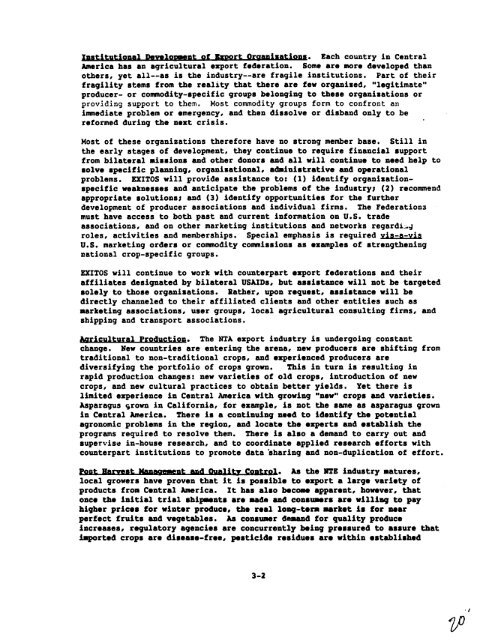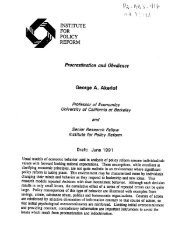MUNZSSInlD - usaid
MUNZSSInlD - usaid
MUNZSSInlD - usaid
Create successful ePaper yourself
Turn your PDF publications into a flip-book with our unique Google optimized e-Paper software.
Institutional Develogment of Exnort Organizations. Each country in Central<br />
America has an agricultural export federation. Some are more developed than<br />
others, yet all--as is the industry--are fragile institutions. Part of their<br />
fragility stems from the reality that there are few organized, "legitimate"<br />
producer- or commodity-specific groups belonging to these organizations or<br />
providing support to them. Most commodity groups form to confront an<br />
innediate problem or emergency, and then dissolve or disband only to be<br />
reformed during the next crisis.<br />
Most of these organizations therefore have no strong member base. Still in<br />
the early stages of development, they continue to require financial support<br />
from bilateral missions and other donors and all will continue to need help to<br />
solve specific planning, organizational, administrative and operational<br />
problems. EXITOS will provide assistance to: (1) identify organizationspecific<br />
weaknesses and anticipate the problems of the industry; (2) recommend<br />
appropriate solutions; and (3) identify opportunities for the further<br />
development of producer associations and individual firms. The Federations<br />
must have access to both past and current information on U.S. trade<br />
associations, and on other marketing institutions and networks regardi.<br />
roles, activities and memberships. Special emphasis is required vis-a-vis<br />
U.S. marketing orders or commodity commissions as examples of strengthening<br />
national crop-specific groups.<br />
EXITOS will continue to work with counterpart export federations and their<br />
affiliates designated by bilateral USAIDs, but assistance will not be targeted<br />
solely to those organizations. Rather, upon request, assistance will be<br />
directly channeled to their affiliated clients and other entities such as<br />
marketing associations, user groups, local agricultural consulting firms, and<br />
shipping and transport associations.<br />
Agricultural Production. The NTA export industry is undergoing constant<br />
change. New countries are entering the arena, new producers are shifting from<br />
traditional to non-traditional crops, and experienced producers are<br />
diversifying the portfolio of crops grown. This in turn is resulting in<br />
rapid production changes: new varieties of old crops, introduction of new<br />
crops, and new cultural practices to obtain better yields. Yet there is<br />
limited experience in Central America with growing "new" crops and varieties.<br />
Asparagus grown in California, for example, is not the same as asparagus grown<br />
in Central America. There is a continuing need to identify the potential<br />
agronomic problems in the region, and locate the experts and establish the<br />
programs required to resolve them. There is also a demand to carry out and<br />
supervise in-house research, and to coordinate applied research efforts with<br />
counterpart institutions to promote data sharing and non-duplication of effort.<br />
Post Harvest Nansaement and Ouality Control. As the NTE industry matures,<br />
local growers have proven that it is possible to export a large variety of<br />
products from Central America. It has also become apparent, however, that<br />
once the initial trial shipments are made and consumers are willing to pay<br />
higher prices for winter produce, the real long-term market Is for near<br />
perfect fruits and vegetables. As consumer demand for quality produce<br />
increases, regulatory agencies are concurrently being pressured to assure that<br />
imported crops are disease-free, pesticide residues are within established<br />
3-2

















